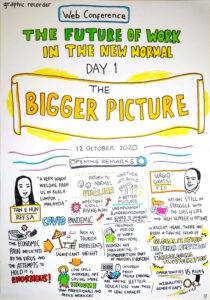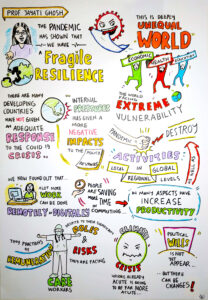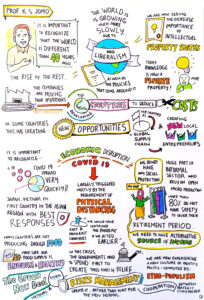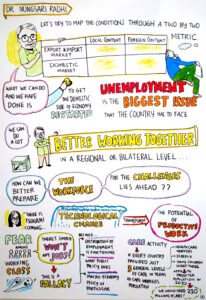The Future of Work in the New Normal
Session 1: The Bigger Picture
Jointly organised by REFSA and FES
Full Recording
Presentation by Prof. Jomo Kwame Sundaram
Presentation by Prof. Jayati Ghosh
Presentation by Dr. Nungsari Radhi
Panel of experts discuss the global trend in a post COVID-19 world, and the need for a new economic and social paradigm
Originated as a public health crisis, the COVID-19 pandemic has also developed into a global economic crisis, with severe and potentially lasting impacts on economic activity, trade, employment, and the world of work. Beyond the tragic loss of human life, the multidimensional crisis will likely inflict a tremendous human cost in many other ways, like increasing poverty, long-term debt and inequality as well as unemployment, and affecting even more those who are already vulnerable.
Apart from social distancing measures to contain the pandemic, governments across Asia have used their national automatic stabilizers and put forward stimulus packages to flatten the recession curve and to save jobs.
Many governments pay a lot of attention to job security, while some politicians are calling instead for accelerated automation and robotation as a crisis response to make the national industry more “resilient and efficient”.
From a global perspective the economic model of export-led growth has been significantly weakened. While almost all countries as an immediate response closed their borders in the early stage of the pandemic, the trend of near-shoring and reshoring has been further accelerated.
Furthermore, the Covid-19 crisis has not led to more cooperation between superpowers, but instead has aggravated existing tensions and will probably feed into the ongoing trend of “globalisation”.
Many observers therefore expect a re-organisation or even balkanization of global and regional supply chains. The specific impact for individual countries will depend among others on: The re-positioning within global value chains; industrial policies and relations; labour market policies; education, qualification and training policies; regional as well as international coordination and cooperation.
Keynote speakers:
Prof. Jomo Kwame Sundaram, Former United Nations Assistant Secretary-General for Economic Development, Senior Adviser, Khazanah Research Institute, Malaysia
Prof. Jayati Ghosh, Professor of Economics, Centre for Economic Studies and Planning, School of Social Sciences, Jawaharlal Nehru University, India
Dr. Nungsari Radhi, Economist, The Edge Columnist, Malaysia
SUMMARY
A summary of the discussion can be found here.
NEWS
Event reported in The Malaysian Insight.
DOODLES
A series of doodles presentation highlighting key points are showcased below:




